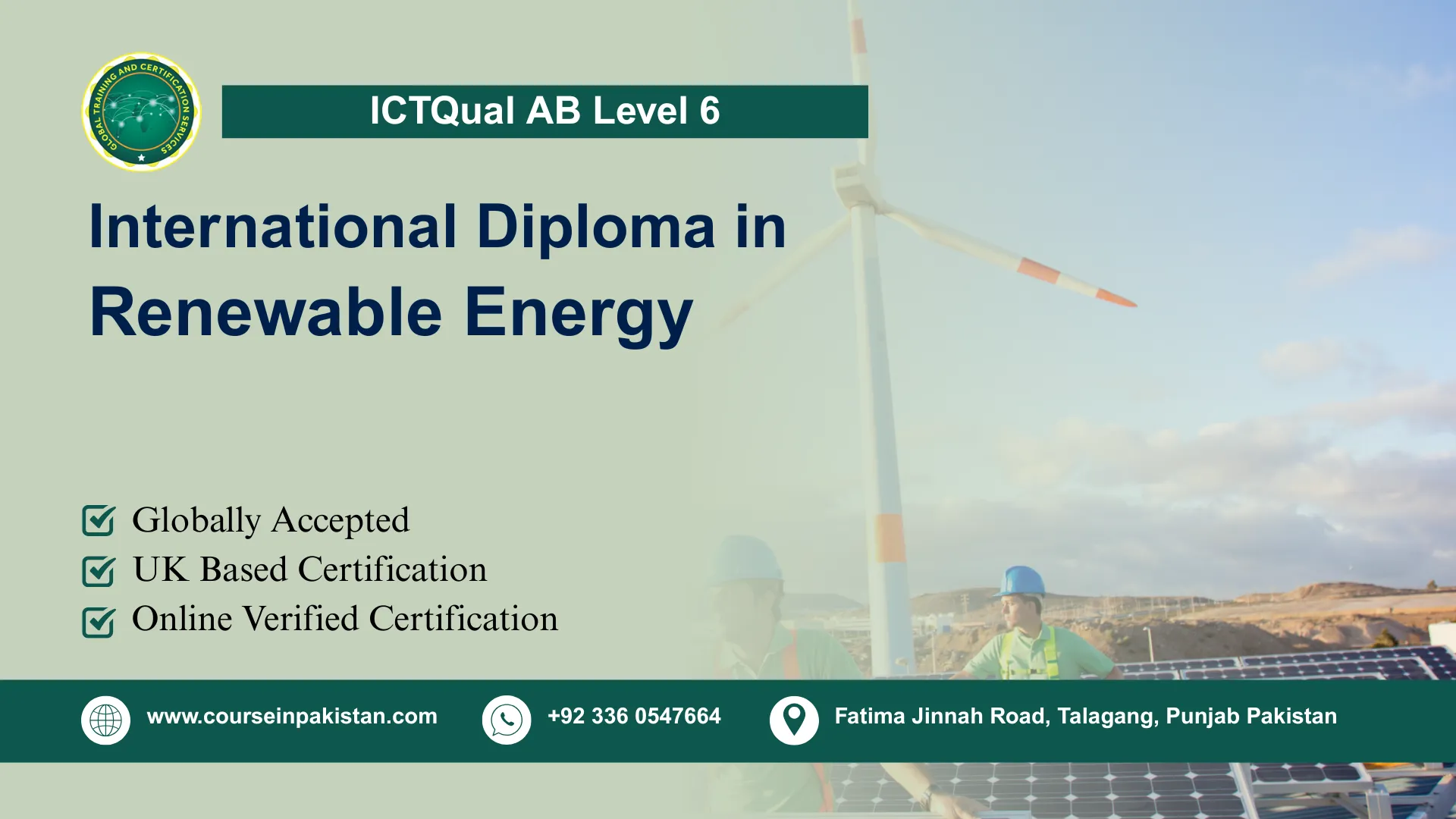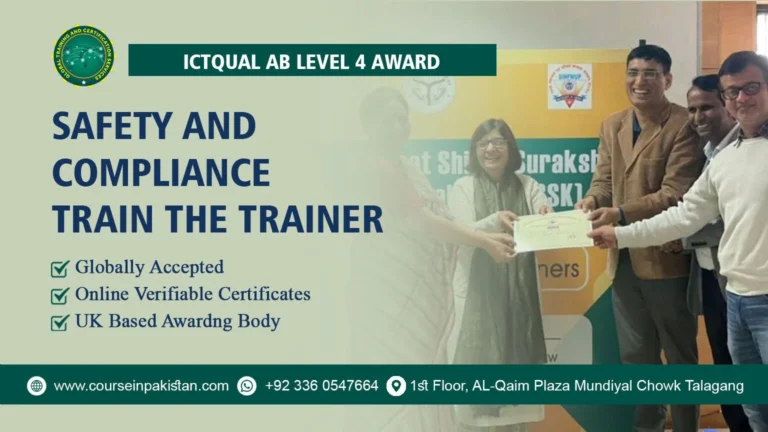
The diploma emphasizes a combination of theoretical understanding and practical application, including project case studies, simulation tools, and industry-standard practices. Graduates will develop competencies in energy project management, sustainability assessment, and regulatory compliance, making them capable of leading renewable energy initiatives,
The ICTQual AB Level 6 International Diploma in Renewable Energy is designed to equip learners with advanced knowledge and practical skills in renewable energy technologies, systems, and management. This program covers solar, wind, hydro, biomass, and emerging renewable energy sources, along with energy storage, grid integration, and sustainability principles. Learners will gain expertise in designing, implementing, and managing renewable energy projects, preparing them for key roles in the global green energy sector.
Course Overview
The ICTQual AB Level 6 International Diploma in Renewable Energy is a globally recognized qualification designed to equip learners with advanced knowledge and practical skills in renewable energy technologies, sustainable energy solutions, and energy management systems. This 360-credit, fully assignment-based diploma allows learners to study at their own pace from anywhere in the world. It is British Council verificable and MOFA and Embassy attestable, making it highly suitable for employment, career advancement, and iqama approval. The course covers essential topics such as solar, wind, hydro, and bioenergy technologies, energy storage systems, grid integration, and sustainable energy policies, preparing learners to design, implement, and manage renewable energy projects effectively.
This qualification is suitable for both fresh learners and experienced professionals. Fresh students are required to complete all 36 mandatory assignments within three years, while experienced and competent individuals with at least six years of relevant experience can complete the certification in a shorter time by submitting verifiable experience and defending their knowledge in professional discussion meetings with an ICTQual AB approved assessor, without completing all mandatory assignments. By the end of the program, learners will have acquired the technical expertise, strategic planning skills, and leadership abilities required to take on senior roles in renewable energy development, sustainable power management, and environmental energy initiatives, ensuring career growth and international professional recognition.
Key Highlights of the Course:
- Advanced training in solar, wind, hydro, and biomass energy systems
- Practical experience in energy project design, implementation, and management
- Focus on sustainability, environmental impact, and energy efficiency
- Development of strategic and managerial skills for renewable e
Course Benefits
Develop Expertise in Renewable Energy
- Gain in-depth knowledge of multiple renewable energy sources and technologies
- Learn to design, implement, and manage sustainable energy projects
Enhance Technical and Analytical Skills
- Master energy system optimization, project monitoring, and simulation tools
- Analyze data to improve energy efficiency and project performance
Expand Career Opportunities
- Prepare for roles such as Renewable Energy Engineer, Project Manager, or Energy Consultant
- Increase employability in international energy companies and sustainability-focused organizations
Leadership and Strategic Skills
- Develop project management, decision-making, and team leadership abilities
- Lead renewable energy projects while ensuring compliance with environmental standards
Course Study Units
This qualification, the ICTQual AB Level 6 International Diploma in Renewable Energy, consists of 36 mandatory units.
Year 1 – Foundation in Renewable Energy
- Principles of Renewable Energy Systems
- Introduction to Sustainable Energy Technologies
- Solar Energy Fundamentals
- Wind Energy Basics and Applications
- Hydroelectric Power Principles
- Biomass and Bioenergy Fundamentals
- Energy Conversion and Storage Basics
- Electrical and Mechanical Principles for Decarbonised Energy
- Health, Safety, and Environmental Awareness
- Laboratory Techniques in Renewable Energy
- Technical Report Writing
- Introduction to Renewable Energy Simulation Software
Year 2 – Intermediate Renewable Energy
- Advanced Solar Photovoltaic Systems
- Wind Turbine Design and Operations
- Hydropower Plant Design and Management
- Biomass Conversion and Biofuel Production
- Energy Storage Systems and Technologies
- Smart Grids and Energy Distribution
- Process Control and Automation in Renewable Energy
- Energy Efficiency and Management Strategies
- Environmental Impact Assessment and Sustainability
- Quality Control and Assurance in Energy Systems
- Project Planning and Technical Communication
- Data Analysis for Renewable Energy Projects
Year 3 – Advanced Renewable Energy
- Advanced Energy Systems Optimisation and Troubleshooting
- Energy Project Management
- Emerging Technologies in Solar and Wind Energy
- Advanced Energy Storage and Battery Technologies
- Smart Grid Integration and Management
- Sustainability and Cleaner Energy Practices
- Risk Assessment and Hazard Analysis in Energy Projects
- Advanced Laboratory Techniques and Field Testing
- Supply Chain and Logistics in Renewable Energy
- Capstone Project in Future Energy Technologies
- Professional Development and Leadership in Energy
- Strategic Decision-Making in Renewable Energy Operations
Learning Outcomes
Year 1 – Foundation in Renewable Energy
Principles of Renewable Energy Systems
- Understand fundamental concepts and types of renewable energy systems
- Analyze energy flows and conversion processes for sustainability
Introduction to Sustainable Energy Technologies
- Comprehend different sustainable energy technologies and their applications
- Evaluate the global importance of renewable energy adoption
Solar Energy Fundamentals
- Understand photovoltaic and thermal solar energy principles
- Apply solar energy concepts in practical system design
Wind Energy Basics and Applications
- Comprehend wind energy generation and turbine operation principles
- Evaluate site suitability and wind resource potential
Hydroelectric Power Principles
- Understand small- and large-scale hydropower generation principles
- Analyze the environmental and operational aspects of hydropower projects
Biomass and Bioenergy Fundamentals
- Comprehend biomass conversion techniques and energy production
- Assess sustainability and efficiency of bioenergy systems
Energy Conversion and Storage Basics
- Understand energy conversion processes and storage technologies
- Apply basic concepts to optimize energy supply and reliability
Electrical and Mechanical Principles for Decarbonised Energy
- Comprehend core electrical and mechanical engineering principles
- Apply principles to renewable energy system design and operation
Health, Safety, and Environmental Awareness
- Identify hazards and implement safety measures in renewable energy operations
- Apply environmental regulations to energy projects
Laboratory Techniques in Renewable Energy
- Perform practical experiments to evaluate renewable energy systems
- Analyze data for operational and design improvements
Technical Report Writing
- Produce structured, professional reports on technical energy projects
- Communicate research and analysis effectively
Introduction to Renewable Energy Simulation Software
- Utilize simulation tools to model renewable energy systems
- Analyze simulated outputs to optimize performance and efficiency
Year 2 – Intermediate Renewable Energy
Advanced Solar Photovoltaic Systems
- Design and implement advanced solar PV systems
- Optimize efficiency through technical and environmental considerations
Wind Turbine Design and Operations
- Understand wind turbine aerodynamics, mechanics, and operations
- Apply best practices in maintenance and performance optimization
Hydropower Plant Design and Management
- Plan and manage small- and large-scale hydroelectric plants
- Evaluate technical, financial, and environmental aspects
Biomass Conversion and Biofuel Production
- Implement biomass conversion and biofuel production processes
- Assess energy yield, sustainability, and environmental impact
Energy Storage Systems and Technologies
- Understand battery, thermal, and mechanical energy storage technologies
- Apply storage solutions to optimize energy availability and reliability
Smart Grids and Energy Distribution
- Comprehend smart grid technologies and energy distribution systems
- Analyze grid integration strategies for renewable energy
Process Control and Automation in Renewable Energy
- Implement automated control systems in energy operations
- Monitor and optimize renewable energy plant performance
Energy Efficiency and Management Strategies
- Apply techniques to reduce energy loss and improve efficiency
- Develop strategies for operational and resource optimization
Environmental Impact Assessment and Sustainability
- Conduct environmental impact assessments for energy projects
- Apply sustainable practices and compliance measures
Quality Control and Assurance in Energy Systems
- Monitor and assure quality in renewable energy production
- Implement best practices in energy system reliability
Project Planning and Technical Communication
- Plan energy projects from conception to execution
- Communicate technical information effectively to stakeholders
Data Analysis for Renewable Energy Projects
- Analyze operational and environmental data
- Make informed decisions to optimize energy systems
Year 3 – Advanced Renewable Energy
Advanced Energy Systems Optimisation and Troubleshooting
- Optimize renewable energy systems for maximum performance
- Diagnose and troubleshoot operational issues efficiently
Energy Project Management
- Manage renewable energy projects including resources, timelines, and budgets
- Apply project management principles to ensure successful delivery
Emerging Technologies in Solar and Wind Energy
- Analyze cutting-edge technologies in solar and wind energy
- Apply innovations to improve efficiency and sustainability
Advanced Energy Storage and Battery Technologies
- Understand advanced storage solutions and battery management systems
- Integrate storage systems with renewable energy grids effectively
Smart Grid Integration and Management
- Plan and manage smart grid operations with renewable energy input
- Optimize energy distribution and reliability through integration
Sustainability and Cleaner Energy Practices
- Implement sustainable practices in all renewable energy operations
- Evaluate environmental and societal impacts of energy projects
Risk Assessment and Hazard Analysis in Energy Projects
- Conduct comprehensive risk assessments for renewable energy projects
- Develop mitigation and emergency response strategies
Advanced Laboratory Techniques and Field Testing
- Perform advanced experiments and field testing for energy systems
- Analyze results to improve technology implementation and efficiency
Supply Chain and Logistics in Renewable Energy
- Manage procurement, logistics, and supply chain in energy projects
- Ensure timely delivery of materials and components for optimal project performance
Capstone Project in Future Energy Technologies
- Apply cumulative knowledge to a comprehensive renewable energy project
- Solve real-world challenges and propose innovative solutions
Professional Development and Leadership in Energy
- Develop leadership, team management, and strategic skills
- Lead renewable energy projects and teams in complex operational environments
Strategic Decision-Making in Renewable Energy Operations
- Make informed decisions integrating technical, financial, and sustainability considerations
- Implement strategies for efficient and reliable renewable energy operations
Who is This Course For?
Aspiring Renewable Energy Professionals
- Individuals aiming to start a career in renewable energy, sustainable power systems, or clean technology
- Learners motivated to work in multinational energy companies, green technology firms, or public-sector energy projects
Engineering and Technical Graduates
- Graduates in electrical, mechanical, chemical, or energy engineering seeking specialization in renewable energy
- Individuals looking to gain practical skills in solar, wind, hydro, and biomass energy systems
Industry Practitioners
- Professionals already working in energy, oil, gas, or industrial sectors seeking advanced knowledge in sustainable energy
- Individuals aiming for career growth into operational, technical, or managerial positions in renewable energy projects
Environmentally Conscious Learners
- Learners committed to implementing sustainable and cleaner energy practices
- Individuals interested in reducing carbon footprints and promoting energy efficiency in projects
Future Progression
- Renewable Energy Engineer, Solar/Wind Energy Specialist, or Energy Systems Analyst
- Project Manager or Technical Lead for renewable energy installations
- Specialist roles in energy storage, smart grid integration, or sustainable energy optimization
- Leadership roles in sustainability, policy compliance, or clean energy initiatives
- Postgraduate studies in Renewable Energy, Energy Management, or Sustainability
Academic Pathways:
- Master’s programs in Renewable Energy, Sustainable Engineering, or Energy Technology
- Postgraduate diplomas in Energy Management, Clean Technology, or Industrial Sustainability
- Professional certifications in solar, wind, hydro, or smart grid technologies
- Specialized training in energy storage, automation, and emerging renewable energy innovations
Conclusion
The ICTQual AB Level 6 International Diploma in Renewable Energy equips learners with advanced technical, analytical, and managerial skills to excel in the global renewable energy industry. Graduates gain expertise in solar, wind, hydro, and biomass energy systems, energy storage, smart grids, and sustainable practices. This qualification prepares professionals to lead renewable energy projects, optimize energy systems, and contribute to a sustainable and low-carbon future.





